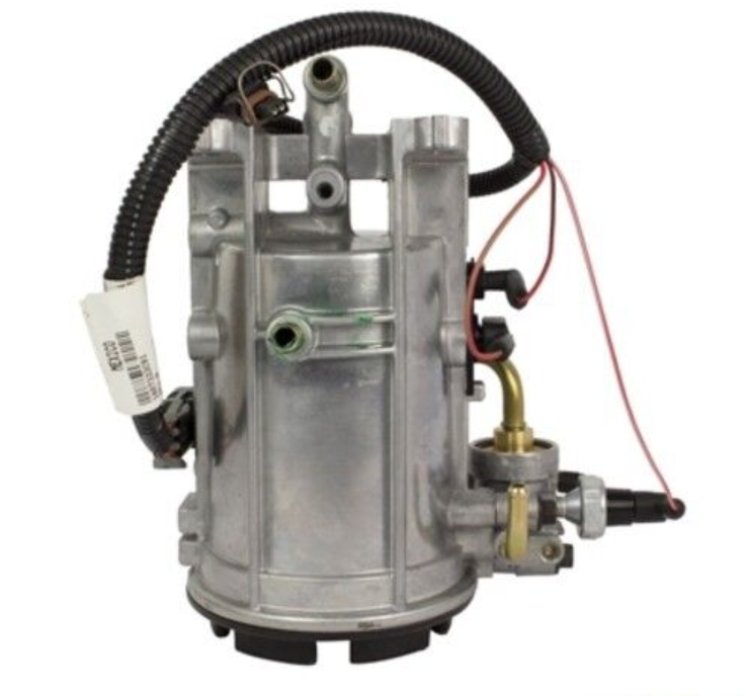Fuel Water Separators: Ensuring Clean Fuel and Optimal Engine Performance
A fuel water separator is a filtration device that removes water and other contaminants from fuel, preventing damage to the engine and fuel system. It works by using a combination of coalescing and/or gravity separation. Water, being denser than fuel, settles out or forms larger droplets that are more easily separated. These separators are crucial in various applications, including automotive, marine, aviation, and heavy-duty equipment, ensuring clean fuel for optimal performance, longevity, and reduced emissions. Regular maintenance, including draining accumulated water and replacing the filter element, is essential for effective operation.
Share this Post to earn Money ( Upto ₹100 per 1000 Views )

Fuel Water Separators are essential devices designed to remove water from fuel, preventing damage to engines and fuel systems.
The Problem of Water in Fuel:
Water can enter fuel systems through various avenues, including condensation within fuel tanks due to temperature fluctuations, leaks in storage containers, or even during the refining and transportation process.
- Corrosion: Water promotes rust and corrosion within fuel tanks, fuel lines, pumps, injectors, and other critical components.
This corrosion can lead to leaks, component failures, and ultimately, engine damage. - Fuel Injector Clogging: Water can cause fuel injectors to become clogged, disrupting the proper fuel spray pattern and leading to incomplete combustion, reduced power, and increased emissions.
- Microbial Growth: Water provides a breeding ground for microorganisms like bacteria and fungi.
These microbes can form a slimy biomass that clogs fuel filters, accelerates corrosion, and degrades fuel quality. - Ice Formation: In colder climates, water can freeze and form ice crystals that block fuel lines and filters, starving the engine of fuel and potentially causing it to stall.
- Reduced Lubricity: Water can wash away the lubricating properties of fuel, particularly in diesel engines, leading to increased wear and tear on engine components.
How Fuel Water Separators Work:
Fuel water separators employ various techniques to effectively remove water from fuel. The most common methods include:
- Coalescing: This is the most prevalent method. Fuel is passed through A Filter element made of a hydrophobic (water-repelling) material. Tiny water droplets suspended in the fuel are attracted to the filter media and coalesce, forming larger droplets.
These larger droplets, being heavier than the fuel, then separate and settle to the bottom of the separator's collection bowl. - Separation by Gravity: This method relies on the difference in density between water and fuel. The fuel-water mixture is allowed to sit in a chamber. Water, being denser, settles to the bottom, while the lighter fuel remains on top.
This method is often used as a pre-separation stage before coalescing. - Filtration: While primary separation is achieved through coalescing or gravity, the filter element also plays a role in removing particulate matter and other contaminants from the fuel.
Types of Fuel Water Separators:
Fuel water separators are available in various configurations to suit different applications and fuel types:
- Spin-on Filters: These are self-contained units that are easily replaceable.
They typically incorporate a filter element, a water collection bowl, and a drain valve. Spin-on filters are commonly used in automotive, marine, and small engine applications. - Cartridge-Type Separators: These systems utilize a replaceable filter cartridge housed within a permanent body.
They are often used in heavy-duty applications, such as trucks, construction equipment, and generators. - Two-Stage Separators: These systems employ two separation stages. The first stage typically uses gravity separation to remove larger water droplets, while the second stage uses coalescing to remove the remaining smaller droplets. This configuration provides higher separation efficiency.
Applications of Fuel Water Separators:
Fuel water separators are crucial in a wide range of applications:
- Automotive: Protecting fuel systems in cars, trucks, and motorcycles.
- Marine: Ensuring reliable operation of boat engines, preventing corrosion and fuel system damage in harsh marine environments.
- Aviation: Critical for aircraft engines, where fuel contamination can have catastrophic consequences.
- Heavy-Duty Equipment: Protecting diesel engines in construction equipment, agricultural machinery, and mining vehicles.
- Generators: Ensuring the reliable operation of backup power systems.
- Fuel Storage and Distribution: Removing water from fuel in storage tanks and dispensing systems.
Benefits of Using Fuel Water Separators:
- Extended Engine Life: By preventing corrosion and wear, fuel water separators contribute to a longer engine lifespan.
- Improved Fuel Efficiency: Clean fuel leads to more complete combustion, resulting in better fuel economy.
- Reduced Emissions: Cleaner burning fuel reduces harmful emissions.
- Enhanced Performance: Consistent fuel delivery ensures optimal engine performance and power output.
- Reduced Maintenance Costs: Preventing fuel system damage minimizes costly repairs and downtime.
- Increased Reliability: Fuel water separators improve the overall reliability of fuel systems, reducing the risk of unexpected breakdowns.
Maintenance of Fuel Water Separators:
Regular maintenance is essential to ensure the effectiveness of fuel water separators:
- Draining: The water collection bowl should be drained regularly to prevent it from becoming full.
The frequency of draining depends on the level of water contamination and the separator's capacity. - Filter Replacement: The filter element should be replaced according to the manufacturer's recommendations. Regular filter changes ensure optimal separation efficiency.
- Inspection: The separator should be inspected periodically for leaks, damage, or other signs of wear.
- Fuel System Cleaning: In cases of severe contamination, the entire fuel system may need to be cleaned to remove any accumulated water or debris. Also read it
Choosing the Right Fuel Water Separator:
Selecting the appropriate fuel water separator depends on several factors, including:
- Fuel Type: Different separators are designed for different fuel types (gasoline, diesel, etc.).
- Flow Rate: The separator should be sized to handle the fuel flow rate of the engine or system.
- Filter Micron Rating: The micron rating indicates the size of particles the filter can remove.
A lower micron rating provides finer filtration. - Application: The specific application will dictate the type and size of separator required.
By understanding the importance of clean fuel and implementing a proper fuel water separation system, users can significantly improve engine performance, extend equipment lifespan, and minimize operational costs.

 alenanora
alenanora 














